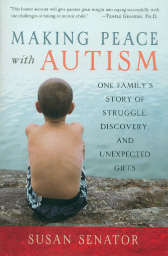The challenges and rewards of raising an autistic child.
By Jennifer Pinto-Martin

MAKING PEACE WITH AUTISM:
One Family’s Story of Struggle, Discovery, and Unexpected Gifts
By Susan Senator C’84 G’85. Trumpeter, 2005. $22.95.
Parents: Recall the number of times you pulled out your Dr. Spock or called upon a friend, relative, or pediatrician with questions about your child’s development. What was considered normal? Did you need to be concerned about certain behaviors? What could you do to manage certain behavioral issues?
All of these common parental concerns are amplified for someone raising a child with a developmental disability. When the disability is autism, the answers are few and far between.
Autism spectrum disorder (ASD) is much more common today than it was 30 years ago, yet we know very little about the etiology, the developmental expectations, or the best treatment course to follow. Susan Senator chronicles the incredible journey of raising a son with autism: from recognition that something was not right, to diagnosis, to navigating the myriad behavioral challenges and treatment decisions she and her family faced.
Making Peace with Autism is filled with warmth and humor; this is not a woman who sat down and felt sorry for herself. She describes the frustrations and the unexpected joys of raising Nathaniel, her first-born, and provides rich details about the complex world of autism.
Senator’s growing concerns and the ease with which others (including her pediatrician) dismissed them are vividly portrayed. Though she sensed there was something missing in her interactions with Nathaniel from the time he was an infant, her lack of parenting experience allowed her to be reassured that all was well. This is a story one hears frequently from families of children on the autism spectrum, and it is one of the reasons there is now a strong push for systematic developmental screening as part of routine pediatric care by the American Academy of Pediatrics and the Centers for Disease Control and Prevention.
Making Peace is filled with solid, practical advice, much of it in the form of information “boxes” addressing such issues as preparing for an individual education plan (IEP), managing the specialists who work with your child, and preparing for a successful beach vacation with your autistic child. It is easy to imagine parents whose child has been diagnosed with an autism spectrum disorder consulting this book for advice and reassurance that they are not the first to face this issue, whether it be a sleep problem, a toilet-training issue, or sibling rivalry. Because the manifestation of the problem may be rather more dramatic in the case of a child with autism, the need for reassurance is therefore that much greater. Consider, for example, a child who attacks and claws his mother in a rage because he has been told that they will be getting off at a different subway stop than the one he is accustomed to. Nat’s obsession with precise and predictable routine is not uncommon for a child with autism, but how would a parent know this without a resource such as Making Peace to consult?
Senator is brutally honest about the different views held by her and her husband, Ned, especially around the issue of how hard to push Nat to achieve new heights versus allowing him to be successful at his current level. This is a common debate in families with normally developing children, yet for a child with autism, the consequences of a wrong choice can be profound.
She also writes with honesty about the difficult sibling interactions and the poignant moments of acceptance and love among Nat and his two younger brothers, Max and Ben. Max was only two years younger than Nat and had already developed an attachment to him before his erratic behaviors began. Ben, who came along six years later, was much less tolerant of Nat and resented the ways in which the family had to accommodate his autism.
Some of the most chilling passages in the book chronicle the strategies Senator and her husband employed in order to control Nat’s most difficult behaviors. She writes about having to “be cruel to be kind” and never apologizes for the choices they made. In truth, their strategies had more to do with the power of suggestion than any real action on their part, but it was clearly not easy for Senator to have to trick her child into behaving appropriately.
This book is as much about the very nature of parenting as it is about autism. The issues Senator raises are issues faced, in some measure, by every family, and she captures the hard work as well as the importance of enjoying life along the way. Making Peace is a book that every parent should read, for it provides tremendous insight into the mind of an autistic person, and is likely to engender compassion and understanding towards individuals with autism spectrum disorder.
Dr. Jennifer Pinto-Martin is a professor of nursing at Penn and director of the Center for Autism and Developmental Disabilities Research and Epidemiology.




